
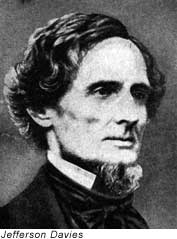 Alabama has an interesting history. During the Civil War, Montgomery, the state capital, was the capital of the Confederate States of America. Because of this, Montgomery is known as the "Cradle of the Confederacy." It is also the birthplace of the Confederate Constitution, and where Jefferson Davis was sworn in as President of the Confederacy in Alabama. In fact, because of the state's Civil War history and central location in the Deep South, Alabama is known as the "Heart of Dixie Land." Alabama has an interesting history. During the Civil War, Montgomery, the state capital, was the capital of the Confederate States of America. Because of this, Montgomery is known as the "Cradle of the Confederacy." It is also the birthplace of the Confederate Constitution, and where Jefferson Davis was sworn in as President of the Confederacy in Alabama. In fact, because of the state's Civil War history and central location in the Deep South, Alabama is known as the "Heart of Dixie Land."
Another of Alabama's nicknames is the "Yellowhammer State." The state probably got this nickname because its Confederate troops placed yellow trimmings on their uniforms during the Civil War. Yellowhammers are birds with yellow patches under their wings.

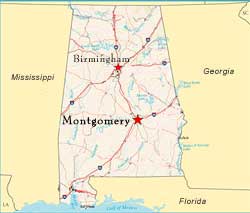 Alabama is an East South Central state bordered by Tennessee to the north, Georgia to the east, Florida and the Gulf of Mexico to the south, and Mississippi to the west. The state has a panhandle along the Gulf of Mexico and boasts a subtropical climate with long, hot summers and mild winters. Mobile, the state's only seaport, is a major United States seaport; Alabama has one of the best water-transportation systems in the South. Alabama is an East South Central state bordered by Tennessee to the north, Georgia to the east, Florida and the Gulf of Mexico to the south, and Mississippi to the west. The state has a panhandle along the Gulf of Mexico and boasts a subtropical climate with long, hot summers and mild winters. Mobile, the state's only seaport, is a major United States seaport; Alabama has one of the best water-transportation systems in the South.
Alabama's landscape includes forest-covered hills and ridges in the north and dense pine forests, rolling grasslands, and low croplands in the south. The Mobile Delta region in the southern area of the state has numerous swamps and bayous, which are shallow channels filled with slow-moving water. Beaches border Mobile Bay and the Gulf of Mexico at the state's southern tip.

Huge cotton plantations using slave labor were once common in Alabama. Today, cotton is no longer the basis of the state's economy, even though it is still a chief producer of the crop. However, more of the state's land is now used to grow soybeans and corn. Peanuts and melons are other important crops grown in Alabama. Livestock is also raised in the state.
In addition to being an agricultural state, Alabama has emerged as an industrial state. Its rivers are important for flood control and hydroelectric power. The construction and manufacturing industries employ more than a quarter of the state's workers. Alabama also has a prosperous textile industry and about 22 million acres of commercial forestland.
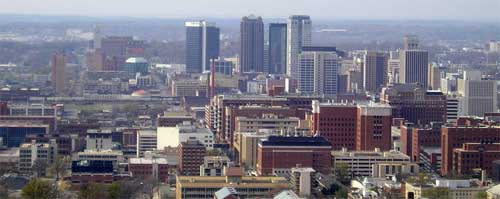
Alabama has rich deposits of iron ore, coal, and limestone. This has helped make the state a leader in steel production. Birmingham (seen above), Alabama's largest city, is the greatest producer of steel in the South.

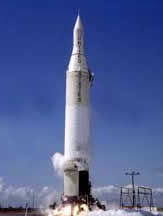
Alabama is also important to the space industry. Huntsville is known as "Rocket City U.S.A." because it is the site of Redstone Arsenal, Marshall Space Flight Center, and the United States Space and Rocket Center. Go to the U.S. Space and Rocket Center to see a large collection of spacecraft and rockets. While you're there, experience the hands-on astronaut training exhibits. If you want to see where the Saturn 5 rocket system, which carried the first astronauts to the moon, was created, go to Huntsville. Scientists have developed many important rockets and spacecraft there.

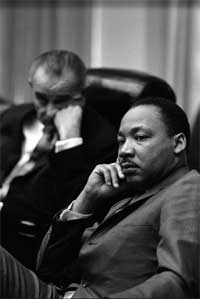 Alabama is also famous for the people who have lived and worked in the state. Martin Luther King, Jr. began his career as a local pastor at Dexter Avenue Baptist Church in Montgomery. After Rosa Parks refused to relinquish her seat in the front of a bus to a white man, King led an important bus boycott in Montgomery during 1955 and 1956. Parks' actions may have sparked the beginning of the Civil Rights Movement. King led African American voter-registration drives throughout Alabama in the early 1960s. After he was arrested during his campaign to desegregate public facilities in 1963, King wrote his "Letter from Birmingham Jail." Governor George Wallace was among the many people who opposed racial integration in the state. In spite of considerable opposition, King continued his struggle for social justice. His efforts played a major role in the passage of the federal Voting Rights Act of 1965. Alabama is also famous for the people who have lived and worked in the state. Martin Luther King, Jr. began his career as a local pastor at Dexter Avenue Baptist Church in Montgomery. After Rosa Parks refused to relinquish her seat in the front of a bus to a white man, King led an important bus boycott in Montgomery during 1955 and 1956. Parks' actions may have sparked the beginning of the Civil Rights Movement. King led African American voter-registration drives throughout Alabama in the early 1960s. After he was arrested during his campaign to desegregate public facilities in 1963, King wrote his "Letter from Birmingham Jail." Governor George Wallace was among the many people who opposed racial integration in the state. In spite of considerable opposition, King continued his struggle for social justice. His efforts played a major role in the passage of the federal Voting Rights Act of 1965.
Other famous people who lived in Alabama include George Washington Carver and Helen Keller. Carver discovered hundreds of new uses for peanuts and sweet potatoes at the Tuskegee Institute. Keller was a famous author and lecturer who showed the world that a blind, deaf person was capable of great accomplishments.
|

![]()
